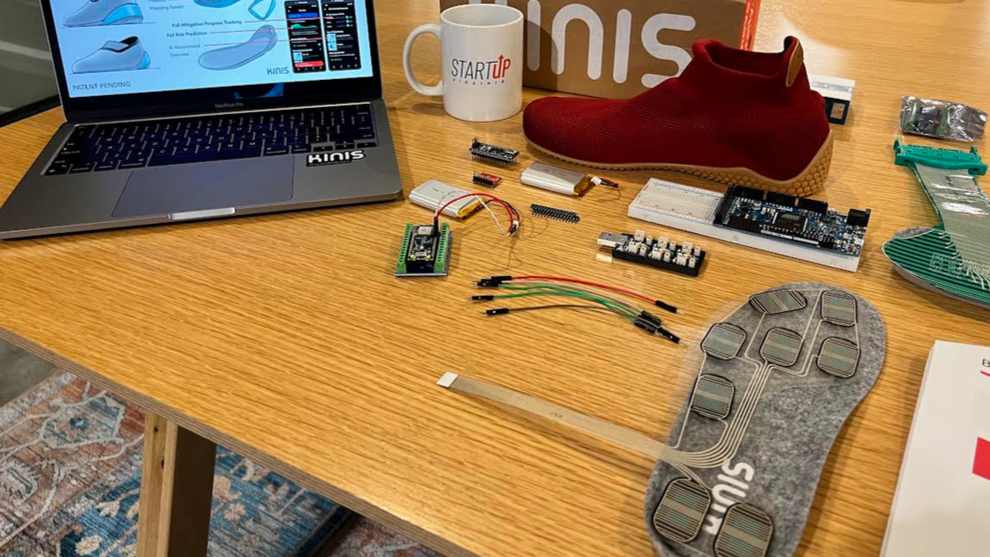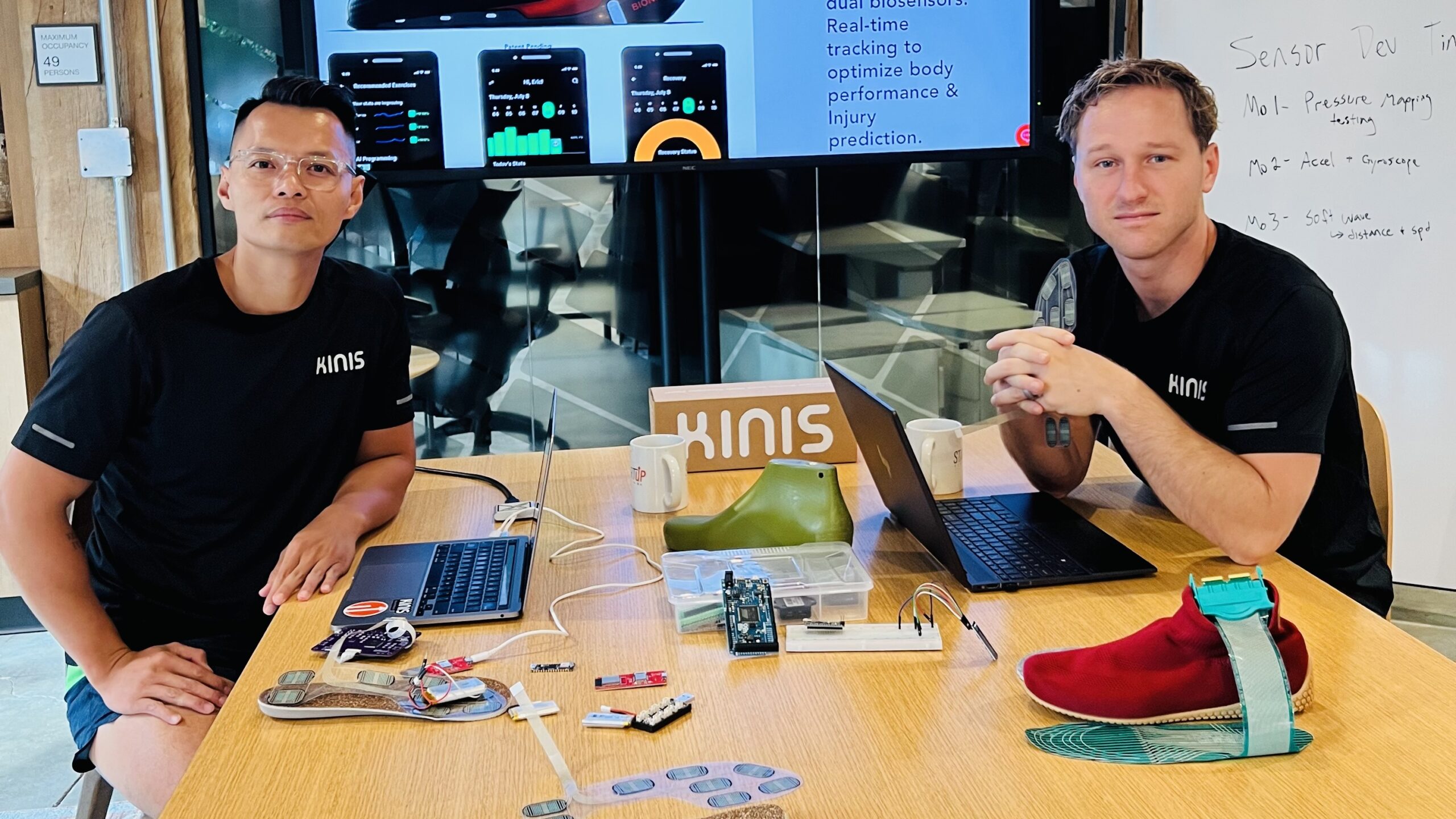A Richmond-based footwear startup is stepping into the tech world with its newest product.
Kinis, founded in 2018 by Vincent Vu, recently completed a proof-of-concept prototype for a new insole product designed to predict the wearer’s risk of falling.
The shoe inserts aren’t intended to prevent a fall as it happens or provide a warning to the wearer about an imminent fall. Rather, it collects and analyzes data about the wearer to improve mobility and decrease the likelihood of falls.
Vu likened the device to the health-monitoring aspects of an Apple Watch, Fitbit or similar product, but one that’s intended to go further in its analysis of the wearer’s movement.
“All of them are giving some sort of movement tracking that empowers users to make a lifestyle change,” Vu said. “Counting steps is easy; we want to go beyond counting steps to show how you move: that’s your gait, that’s your balance, what does that abnormality look like and what is that abnormality leading to?”
The initial prototype was created this summer. Kinis now turns its attention toward further developing the insoles with a goal to have a market-ready product in fall 2024.

Kinis has completed a proof-of-concept iteration of the new insoles product and the prototype is underway on its next phase of development. The insoles are anticipated to hit the market in fall 2024. (Photo courtesy Kinis)
Under development are insoles that would communicate wirelessly with a mobile app. Using data gleaned from the shoe inserts, the app would suggest exercises or recommend healthcare professionals to help the wearer be steadier on their feet.
Pricing for the final insoles product is still being worked on. Vu said that currently under consideration are a one-time purchase cost of $200 to $300 per pair of insoles, or a model in which users pay a monthly subscription of $20 to $30 to get access to the associated app and receive the insoles for free.
Vu said the company has used its own money to fund the insole development, and he estimated the prototype will ultimately cost more than $500,000 to develop. He anticipated Kinis would embark on a capital raise to gather the funding needed to produce and launch the new product.
In July, Kinis was awarded a $75,000 grant from the Commonwealth Commercialization Fund, an economic development program of the nonprofit Virginia Innovation Partnership Corporation. Vu said the funding would be used to develop the insoles prototype.
Kinis, which has a three-person team, launched in 2018 and was inspired by the pain Vu experienced while running. The company designed and sells the Nomad exercise shoe, a casual walking shoe called the Lucy and the Apollo, which is a training shoe.
Vu said Kinis has long had a goal of developing a tech product and began to explore the pivot in 2019.
“We want to get into technology at the end of the day. We believe that allows us to scale much faster than building low-tech products,” he said. “We knew we wanted to bring technology into this but we had to wait to identify the product. We didn’t want to create a smart product for the heck of it.”
Kinis identified falling as a particular health complication for the elderly, and a problem that will grow as the Baby Boomer generation continues to age, in the course of researching health problems the company’s tech product could work to address.
The company was motivated to incorporate artificial intelligence into the product based on the recent bump in awareness of the possibilities of AI thanks to the popularity of ChatGPT and similar programs.
“You look at all the players in the industry, Nike and Adidas, all the big brands. They are ultimately fashion companies. Where we want to position is how can we focus on the science of movement.” Vu said. “With the recent development in AI and everything happening, we asked what can we do with artificial intelligence and machine learning.”
Kinis plans to continue to sell its shoes after the launch of the insoles product. Vu said the company reached profitability in 2021, and has sold more than 10,000 pairs of footwear to date. Kinis only sells its products on its website, and is exploring distribution.
The company contracts with a third-party manufacturer to make the shoes in China. Vu said the company’s prior experience and connections have helped it move forward with the development of the new insoles.
“We know manufacturing, we know branding, we have relationships in play,” he said. “The work we have done the last five years has given us a solid foundation for where we’re going next.”
Kinis has recruited contractors to handle the app’s development and other aspects of the project.
Kinis is based in Startup Virginia, a business incubator in Capital One’s Michael Wassmer Innovation Center in Shockoe Bottom (formerly called the 1717 Innovation Center).
A Richmond-based footwear startup is stepping into the tech world with its newest product.
Kinis, founded in 2018 by Vincent Vu, recently completed a proof-of-concept prototype for a new insole product designed to predict the wearer’s risk of falling.
The shoe inserts aren’t intended to prevent a fall as it happens or provide a warning to the wearer about an imminent fall. Rather, it collects and analyzes data about the wearer to improve mobility and decrease the likelihood of falls.
Vu likened the device to the health-monitoring aspects of an Apple Watch, Fitbit or similar product, but one that’s intended to go further in its analysis of the wearer’s movement.
“All of them are giving some sort of movement tracking that empowers users to make a lifestyle change,” Vu said. “Counting steps is easy; we want to go beyond counting steps to show how you move: that’s your gait, that’s your balance, what does that abnormality look like and what is that abnormality leading to?”
The initial prototype was created this summer. Kinis now turns its attention toward further developing the insoles with a goal to have a market-ready product in fall 2024.

Kinis has completed a proof-of-concept iteration of the new insoles product and the prototype is underway on its next phase of development. The insoles are anticipated to hit the market in fall 2024. (Photo courtesy Kinis)
Under development are insoles that would communicate wirelessly with a mobile app. Using data gleaned from the shoe inserts, the app would suggest exercises or recommend healthcare professionals to help the wearer be steadier on their feet.
Pricing for the final insoles product is still being worked on. Vu said that currently under consideration are a one-time purchase cost of $200 to $300 per pair of insoles, or a model in which users pay a monthly subscription of $20 to $30 to get access to the associated app and receive the insoles for free.
Vu said the company has used its own money to fund the insole development, and he estimated the prototype will ultimately cost more than $500,000 to develop. He anticipated Kinis would embark on a capital raise to gather the funding needed to produce and launch the new product.
In July, Kinis was awarded a $75,000 grant from the Commonwealth Commercialization Fund, an economic development program of the nonprofit Virginia Innovation Partnership Corporation. Vu said the funding would be used to develop the insoles prototype.
Kinis, which has a three-person team, launched in 2018 and was inspired by the pain Vu experienced while running. The company designed and sells the Nomad exercise shoe, a casual walking shoe called the Lucy and the Apollo, which is a training shoe.
Vu said Kinis has long had a goal of developing a tech product and began to explore the pivot in 2019.
“We want to get into technology at the end of the day. We believe that allows us to scale much faster than building low-tech products,” he said. “We knew we wanted to bring technology into this but we had to wait to identify the product. We didn’t want to create a smart product for the heck of it.”
Kinis identified falling as a particular health complication for the elderly, and a problem that will grow as the Baby Boomer generation continues to age, in the course of researching health problems the company’s tech product could work to address.
The company was motivated to incorporate artificial intelligence into the product based on the recent bump in awareness of the possibilities of AI thanks to the popularity of ChatGPT and similar programs.
“You look at all the players in the industry, Nike and Adidas, all the big brands. They are ultimately fashion companies. Where we want to position is how can we focus on the science of movement.” Vu said. “With the recent development in AI and everything happening, we asked what can we do with artificial intelligence and machine learning.”
Kinis plans to continue to sell its shoes after the launch of the insoles product. Vu said the company reached profitability in 2021, and has sold more than 10,000 pairs of footwear to date. Kinis only sells its products on its website, and is exploring distribution.
The company contracts with a third-party manufacturer to make the shoes in China. Vu said the company’s prior experience and connections have helped it move forward with the development of the new insoles.
“We know manufacturing, we know branding, we have relationships in play,” he said. “The work we have done the last five years has given us a solid foundation for where we’re going next.”
Kinis has recruited contractors to handle the app’s development and other aspects of the project.
Kinis is based in Startup Virginia, a business incubator in Capital One’s Michael Wassmer Innovation Center in Shockoe Bottom (formerly called the 1717 Innovation Center).




Great story of entrepreneurship! I love it! Best wishes for the next level up. Since they are being made in China – won’t China steal the IP, make them cheaper, then market them on Temu for 1/2 the price? Produce them in the US – move to Asia to produce the millions of pairs. Serious runners will spend considerable amounts of money on quality and technology – and the buy local thing could entice me…..
I don’t want to be wearing a sneaker that’s smarter than I am.
This is really fascinating! I think fitness lovers always appreciate getting more data on how to improve their movements- even walking. I’ve had a pair of Kinis shoes for years now and love them for my indoor workouts.
Its really cool to see something like this being developed in Richmond. I’m always amazed by what our community is building and creating to share outside of our city.
I wonder if they can make a shoe that will help me dance?